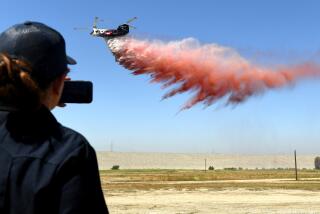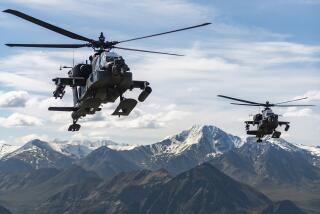CRISIS IN THE BALKANS : U.S. Troops in Germany Ready for Bosnia Call : Military: Black Hawk and Apache helicopter crews get in some practice with live ammunition.
- Share via
GRAFENWOEHR, Germany — On mornings when he hasn’t had to fly the night before and isn’t exhausted, U.S. Army helicopter pilot Melvin Dixon has been getting up at 6 a.m. lately to catch the evening network news as it’s broadcast here from the United States.
“I figure it must be getting interesting, because O.J. Simpson’s getting to be about No. 3 on the list,” Dixon said, adding that practically everyone he knows in the military has been preoccupied with the war in Bosnia-Herzegovina in recent days, what with the taking of hostages, the downing of a U.S. F-16 fighter and the growing possibility that some of the 70,000 U.S. soldiers now stationed in Germany may be sent to rescue the beleaguered U.N. peacekeepers in the Balkans.
Sure enough, Dixon found out Friday that he was being sent over the weekend to a 40,000-acre U.S. Army training range at Grafenwoehr, 110 miles north of Munich, for some live-ammunition gunnery practice at the controls of an Apache attack helicopter.
“Being fully deployed like this gets us interested,” said the 37-year-old Dixon, although he added that Sunday’s thunderous noise of Black Hawk helicopters shooting their heavy machine guns and Apaches firing off rockets was nothing compared to the commotion he saw at Grafenwoehr before shipping out to Operation Desert Storm in December, 1990.
The army’s helicopter exercises got under way the day after Western defense ministers, meeting in Paris, backed the creation of a multinational quick-reaction force with U.S. air support to help protect the U.N. troops in Bosnia and prevent further hostage-taking by Serbian forces.
About 1,900 pilots, gunners, mechanics and others from the 11th Aviation Regiment based in Illesheim, Germany, are to spend 10 days checking their instruments, practicing refueling and rearming operations, and trying to hit targets in daylight, in rain and at night.
None of the Apache crews were permitted to practice firing their laser-guided Hellfire missiles, however, because of safety rules in Germany.
“This is really routine training for us,” said helicopter pilot Scott Allen, who said he was happy to get away from his home base and fly but not eager for Bosnia duty.
“Any time you start to talk about a conflict, we’re the ones who have to endure the hardships,” he said. “We’re not praying for something to happen so that we can get sent there.”
Army officials at Grafenwoehr stressed Sunday that the exercises don’t mean the regiment has been put on alert and said they haven’t received any orders to prepare for specific Bosnia eventualities.
“I was directed to take the steps that I thought were prudent, to get things where I want them to be if I do get the call,” said Col. Jack Bryant, the regiment’s commander. “If I get the call, I don’t want to say, ‘I need a couple of weeks, or months, to get ready.’ ”
Bryant said that under the normal training schedule, his troops would have conducted the live-fire exercises at Grafenwoehr in August.
“We always like to use a live round when we can, because that puts you under a little bit more stress,” he said, explaining that the regiment’s pilots get daily training in flight simulators but that some of them get so good at running the simulator they grow overconfident.
“There’s nothing like being in the dark, with the wind blowing and a heavy load” to cut a cocky pilot down to size, he said. “If I could simulate the fear factor, I wouldn’t even have to bring them out here.”
More to Read
Sign up for Essential California
The most important California stories and recommendations in your inbox every morning.
You may occasionally receive promotional content from the Los Angeles Times.













